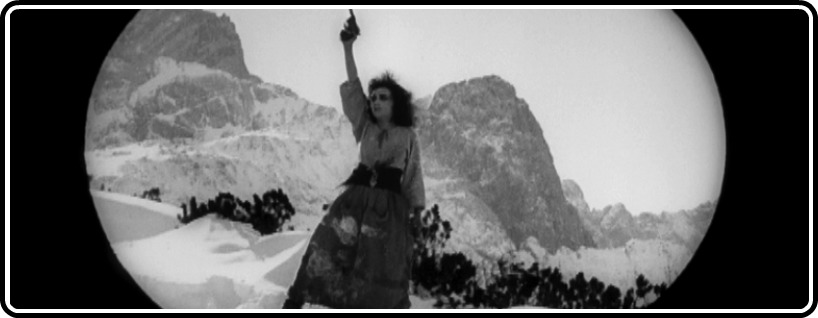As far as filmmakers go, very few were as prolific in their day as director Ernst Lubitsch.
For much of the early part of the icon’s career, he pumped out a cavalcade of shorts and features at a clip rarely seen by filmmakers even today. However, one year saw him not only release only one film, but it saw the release of one of the director’s greatest and most underrated silent features.
Entitled The Wild Cat (Die Bergkatze), the film is one of the many pairings of director Lubitsch and leading lady Pola Negri, and while this relationship is of note, the most impactful thing about this film is the cartoon-style anarchy that the filmmaker not only infused into his early work, but would ultimately soften when making his way into Hollywood starting with the 1923 film, Rosita.
Clocking in at just a little over an hour, the film follows the story of a handsome lieutenant who is brought to a military camp to marry the daughter of the fort’s leader. However, when a bandit’s daughter falls for the man, hilarity and hijinks ensue, in what is both an immensely broad comedy and one that works as effective as any comedy from this time period.
The star here, and the reason to truly seek this film out, is Lubitsch. With a delightfully out of this world aesthetic, Lubitsch’s film has an energy that is completely its own, and one that doesn’t quite have a contemporary from that time. Be it Lubitsch’s use of different lens shapes, ranging from a simple circle to one that cuts off all but the top third of the frame, or his use of super impositions, this film is truly a picture all its own. In a way spoofing the aesthetic of silent epics in its use of frame blocking, this film instead uses different designs like zigzags and corner-to-corner rectangles to add a surreal aspect to its comedy, which itself transcends this era of cinema.
There is one sequence in particular that encompasses all of this film’s anarchic energy. A dream sequence from the point of view of Negri’s character, Rischka, the sequence sees our two lovers in a dance of sorts, sparked by Paul Heidemann’s Alexis literally giving her his heart, a giant heart shaped cookie. What does she proceed to do? Well, she not only takes a giant bite out of it, but the pair then dance in a world of giant, instrument playing white globs. From the very first frames of this film, right until the final ones, this film is as brazen a bit of experimental broad comedy that is as beautifully off base as it is entirely rooted within the world of physical comedy.
Performance-wise, the film is solid. Negri is the showstopper she has become known as here, and while she’s best known for her beauty and her work in dramas, she is revelatory here. Her ability to adapt to slapstick, physically-focused comedy is truly startling. Her, along with Lubitsch, elevate this film to classic status, especially when taken alongside Lubitsch’s other silent works. Surreal to levels unseen by either the director’s other silent comedies or his various dramas, and especially opposite his comparatively sterile Hollywood pictures, this is as impressive a comedy as Lubitsch ever made, even if it thematically doesn’t hold much within its frames.
Pacing may be this film’s only real issue. The film does lag a little bit near the finale, and the final act doesn’t bring much in the way of an emotional payoff. The supporting performances, save for a mustache twirling turn from Victor Janson who is as entertaining a character as Negri’s Rischka, are fine if a tad one note, but all of these seem to take a back seat to Lubitsch’s sense of style.
Ultimately, this film is a perfect example of where style may in fact be justly placed over substance. Your run of the mill romance sets the story for a film that is as breathtaking a silent film experiment as we’ve ever seen. Be it Negri’s Looney Tunes-esque physical performance or Lubitsch’s use of different frame shapes, each moment of this film is as surreal as anything we saw before or we’ve seen since. In researching more about this film, comparisons to Monty Python have been as universal as the comedy found within this film, and one can’t really debate the influence. Oozing a sense of energy that we don’t see very often these days, the film is a far cry from witty and sweet Love Parade or the envelope pushing Design For Living, but one that seems perfectly in step with Lubitsch’s love for the medium. Tossing a few soft jabs at the military when it gets the chance, The Wildcat deserves a spot alongside the rest of Lubitsch’s films not only within the Criterion Collection, but within his canon in general.
But since we are focusing on the Criterion Collection here, where would this fit in and what would we like to see along with it?
Well, the film is available on DVD via Kino, as part of the company’s Lubitsch In Berlin set, so the likelihood of a Criterion release isn’t very high, but it’s more than deserving. Probably best at home as part of a second Lubitsch box set, the film could be paired along with other Lubitsch silent comedies like The Oyster Princess, which itself has seen a resurgence thanks to a new score from Bee vs. Moth, which debuted at SXSW in 2012.
But then again, with the rights seemingly still in the hands of Kino Lorber, it doesn’t seem like this one in particular will be happening very soon. We can all have our dreams though, right?



